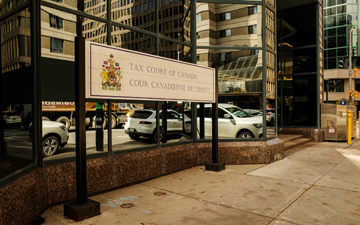Case Commentary: Watts v the King, 2024 TCC 100 — Enhanced costs of litigation

A recent Tax Court of Canada judgment shows why litigants should be aware of all potential court costs asserts tax lawyer and accountant David J Rotfleisch
Introduction
 |
David J Rotfleisch, CPA, JD is the founding tax lawyer of Taxpage.com and Rotfleisch & Samulovitch P.C., a Toronto-based boutique tax law corporate law firm. |
In August 2024, the Tax Court of Canada delivered its judgment in Watts v The King, 2024 TCC 100, awarding the Crown costs beyond the standard tariff amounts, commonly referred to as "enhanced costs," in a lump sum of $30,000.
In making this decision, the Tax Court exercises its broad discretion in awarding costs provided under subsection 147(3) of the Tax Court of Canada Rules (General Procedure) in response to the conduct of the appellant taxpayer, Miriam Watts, which the Court found to be improper.
Improper conduct of the taxpayer
For context, Lawrence Watts, the husband of the appellant Miriam Watts, was subject to a search warrant carried out by the CRA. The documents seized from the search were used to convict Lawrence of creating false tax returns leading to fraudulent refunds. Lawrence was imprisoned as a result.
The Canada Revenue Agency then assessed Ms. Watts under section 160 of the Income Tax Act for property transferred by Mr. Watts to the couple's corporation, then to a trust, and finally to purchase a home in Ms. Watt's name. The Tax Court dismissed Ms. Watt's appeal and affirmed the assessment In Watts v The King, 2023 TCC 11, in January 2023.
Between Mister and Ms. Watt's, the couple had brought three motions to allege violations of their Charter rights in relation to the search warrant and to allege a breach of an order of the Ontario Superior Court. The motions were repeatedly dismissed, and the constitutional legitimacy of the search was confirmed at multiple court levels, including the Ontario Superior Court of Justice, the Ontario Court of Appeal, and the Federal Court, with leave to appeal denied by the Supreme Court of Canada.
The CRA, on the other hand, alleged that Ms. Watt's conduct was vexatious, entitling the Crown to enhanced costs, beyond the tariff provided in Schedule II of the Tax Court of Canada Rules (General Procedure).
Factors and principles in cost awards
Subsection 147(3) of the Tax Court of Canada Rules (General Procedure) provides a list of factors to be considered in determining costs, including, among other factors, the result of the proceeding, the amount in issue, the importance of the issue, the complexity of the issue, the conduct of the parties, the offer of settlement by the parties, the volume of work involved, etc.
The Tax Court has explained that none of the above factors is determinative, and all relevant factors must be considered in conjunction. The Tax Court also reiterates the principles in awarding costs, which are that (1) the costs should be compensatory, not punitive; (2) while being compensatory, the awards are not meant to be fully compensatory of the actual costs; and (3) while the court has broad discretion in awarding costs, the amount must be reasonable, not arbitrary.
Offers of settlement and cost implications
The judicial system encourages the parties to come to an agreement rather than battling it out in court. Either party can make an offer of settlement to the other party before the trial. If the offer is reasonable and the offeree declines the offer, there are cost consequences to the offeree.
Specifically, under subsection 147(3.1) of the Tax Court of Canada Rules (General Procedure), if the taxpayer makes an offer which the CRA declines, and the taxpayer later obtains a judgment as favourable as, or more favourable than, the terms of the offer, the taxpayer is entitled to party and party costs to the date of service of the offer and substantial indemnity costs after that date, plus reasonable disbursements and applicable taxes.
Similarly, under subsection 147(3.2) of the Tax Court of Canada Rules (General Procedure), if the CRA makes an offer which the taxpayer declines, and the taxpayer later obtains a judgment as favourable as or less favourable than the terms of the offer or fails to obtain a judgment, the CRA is entitled to party and party costs to the date of service of the offer and substantial indemnity costs after that date, plus reasonable disbursements and applicable taxes.
For clarification, party and party costs are generally in accordance with the tariff provided in Schedule II of the Tax Court of Canada Rules (General Procedure) unless enhanced costs are warranted, as discussed in this case. Substantial indemnity costs mean 80% of the solicitor and client costs.
In this case, since neither party made an offer of settlement, the above rules were not applicable. However, these rules, which could result in substantial cost consequences, are important to keep in mind.
Application to the case gives rise to enhanced costs
Applying the factors and principles to the determination of costs in this case, the Tax Court found that the taxpayer's three motions of essentially the same legal challenge unnecessarily lengthened the proceeding and added a significant volume of work and a significant level of complexity for the CRA.
Although the taxpayer's allegations were baseless and failed repeatedly, the CRA still had to defend three separate motions involving the Charter and the Criminal Code provisions. As such, the CRA should be entitled to enhanced costs.
As for the quantum of costs, the Tax Court accepted the added costs of $100,000 presented by the CRA and awarded it $30,000, beyond the standard tariff but only 30% of the actual costs, not fully compensatory.
Watts highlights the importance of costs associated with tax litigation. A litigant should be aware of costs beyond the normal costs, such as court fees and lawyer fees. While court fees are standardized, lawyer fees in litigation are typically hourly based.
These costs can already be high by themselves. But if the conduct of a party is not forthcoming, the party may be subject to additional costs as the result of the extra weight unnecessarily put onto the opposing party.
David J Rotfleisch, CPA, JD is the founding tax lawyer of Taxpage.com and Rotfleisch & Samulovitch P.C., a Toronto-based boutique tax law corporate law firm and is a Certified Specialist in Taxation Law who has completed the CICA in-depth tax planning course. He appears regularly in print, radio and TV and blogs extensively.
With over 30 years of experience as both a lawyer and chartered professional accountant, he has helped start-up businesses, cryptocurrency traders, resident and non-resident business owners and corporations with their tax planning, with will and estate planning, voluntary disclosures and tax dispute resolution including tax audit representation and tax litigation. Visit www.Taxpage.com and email David at david@taxpage.com.
Read the original article in full on Taxpage. Author photo courtesy Rotfleisch & Samulovitch P.C. Title image: Tax Court of Canada sign in Ottawa, iStock photo ID:1283116731.









(0) Comments